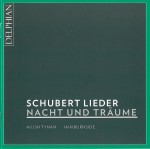Schubert – Lieder: Nacht und Träume
Ailish Tynan; Iain Burnside
Delphian DCD34165
Duet
Lucy Crowe; William Berger; Iain Burnside
Delphian DCD34167
 An accompanist (or, as we now prefer to write, a collaborative pianist) must be a technically accomplished player. That goes without saying. But he also needs to be more: he needs to be alert to a singer’s every nuance. The two discs reviewed here have one performer in common: the pianist Iain Burnside. He is splendid.
An accompanist (or, as we now prefer to write, a collaborative pianist) must be a technically accomplished player. That goes without saying. But he also needs to be more: he needs to be alert to a singer’s every nuance. The two discs reviewed here have one performer in common: the pianist Iain Burnside. He is splendid.
Many of the songs on the Schubert disc are very familiar. Their inclusion came as something of a surprise to me, for Burnside, in a 2009 interview, complained that singers tend to play it safe. He himself felt that he had nothing new to say on the Schubert song cycles. But the record shows that, if singer and pianist are sufficiently committed to the works they perform, these works do not come across as merely routine. The disc includes Schubert’s Ave Maria and I cannot think of any music more familiar. Yet the way Ailish Tynan and Burnside perform it here makes one feel that one has never heard it before. Besides, not everything here is familiar fare; Ave Maria was one of three songs projected by Schubert as a setting of Scott’s The Lady of the Lake. This recording gives us all three songs.
Tynan is an Irish soprano who won the Cardiff Singer of the World recital prize in 2003. She is a lyric soprano who has sung at several of the leading opera houses, including Covent Garden and La Scala. But her main strength would appear to be that of a recitalist. I look forward to hearing her live one day. I have not heard such a fine recital disc by a soprano since the days of Elly Ameling and the young Irmgard Seefried.
 Duet includes a few solo songs but most of the works here are indeed duets, by Schumann, Mendelssohn and Cornelius. In an accompanying note, Richard Stokes argues that the duet form has fallen out of favour because many artists as well as listeners feel that the form is beneath them. I doubt that is the real reason for the drop in popularity in the duet form. Two centuries ago, domestic music making was a central part of people’s experience and both the solo song and the duet must have played an important part in the rituals of courtship in upper- and middle-class society. Be that as it may, these songs, none of them now familiar, were well worth reviving. They are beautifully performed with the radiance of the soprano (Lucy Crowe) set against the gravity of the baritone (William Berger). Of particular interest is the concluding song, a setting of the poem Wiegenlied by Friedrich Hebbel. When Schumann set the poem, he changed the title to Wiegenlied - am Lager eines kranken Kindes. Stokes is, I am sure, right when he argues that the change in title shows an allusion to the illness and death of Schumann’s infant son Emil.
Duet includes a few solo songs but most of the works here are indeed duets, by Schumann, Mendelssohn and Cornelius. In an accompanying note, Richard Stokes argues that the duet form has fallen out of favour because many artists as well as listeners feel that the form is beneath them. I doubt that is the real reason for the drop in popularity in the duet form. Two centuries ago, domestic music making was a central part of people’s experience and both the solo song and the duet must have played an important part in the rituals of courtship in upper- and middle-class society. Be that as it may, these songs, none of them now familiar, were well worth reviving. They are beautifully performed with the radiance of the soprano (Lucy Crowe) set against the gravity of the baritone (William Berger). Of particular interest is the concluding song, a setting of the poem Wiegenlied by Friedrich Hebbel. When Schumann set the poem, he changed the title to Wiegenlied - am Lager eines kranken Kindes. Stokes is, I am sure, right when he argues that the change in title shows an allusion to the illness and death of Schumann’s infant son Emil.



